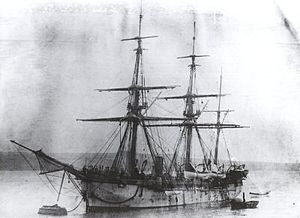Fantome-class sloop
 HMS Egeria
| |
| Class overview | |
|---|---|
| Name | Fantome-class sloops |
| Builders |
|
| Operators | |
| Preceded by | Eclipse class |
| Succeeded by | Osprey class |
| Cost |
|
| Built | 1873–1874 |
| In commission | 1873–1911 |
| Completed | 6 |
| Scrapped | 6 |
| General characteristics | |
| Type | Screw composite sloop |
| Tonnage | 727 bm |
| Displacement | 949 long tons (964 t) |
| Length | 160 ft (48.8 m) (p/p) |
| Beam | 31 ft 4 in (9.6 m) |
| Draught | 14 ft (4.3 m) |
| Depth | 15 ft 6 in (4.7 m) |
| Installed power | 836–1,011 ihp (623–754 kW) |
| Propulsion |
|
| Sail plan | Barque rig |
| Speed | 10–11 knots (19–20 km/h; 12–13 mph) |
| Range | 1,000 nmi (1,900 km; 1,200 mi) at 10 knots (19 km/h; 12 mph) |
| Complement | 140 |
| Armament |
|
The Fantome class was a six-ship class of 4-gun screw composite sloops [2] built for the Royal Navy during 1873 and 1874.
Design[]
Construction[]
Fantome and her sister ships were constructed of an iron frame sheathed with teak and copper (hence 'composite').
Propulsion[]
A two-cylinder horizontal compound-expansion steam engine provided by Humphrys, Tennant & Co. powered an 11-foot (3.4 m) diameter screw. Steam was provided by three cylindrical boilers working at 60 pounds per square inch (4.1 bar). The indicated horsepower varied from 836 to 1,011 ihp (623 to 754 kW). Daring was fitted with a trunk engine provided by John Penn & Sons.[1]
Sailing rig[]
All the ships of the class were provided with a full barque rig.
Armament[]
The Fantome class carried two 7-inch (180 mm) and two 64-pounder muzzle-loading rifles, all mounted on pivots.
Evaluation[]
Built at a time of great technological change in naval architecture, these composite sloops were obsolete before they were completed. Nevertheless, they served a useful function on the far-flung stations of the British Empire, including participation in minor wars, such as the Perak War. They were also used for hydrography, and for this reason Egeria was retained until 1911.
Ships[]
| Name | Ship Builder | Launched | Fate |
|---|---|---|---|
| Fantome | Pembroke Dock | 26 March 1873 | Sold 1889[2][3] |
| Albatross | Chatham Dockyard[1] | 24 July 1873 | Scrapped 1889[2][4] |
| Daring | Blackwall Yard, London | 4 February 1874 | Sold 1889[2][5] |
| Egeria | Pembroke Dock | 1 November 1873 | Sold 1911 [2][6] |
| Flying Fish | Chatham Dockyard[1] | 27 November 1873 | Sold 1888[2][7] |
| Sappho | Money Wigram & Sons, Blackwall Yard[1] | 20 October 1873 | Sold 1887[2][8] |
Notes[]
- ^ a b c d e Winfield (2004)
- ^ a b c d e f g "Naval Sloops at battleships-cruisers.co.uk". Retrieved 30 August 2008.
- ^ "HMS Fantome at William Looney website". Retrieved 30 August 2008.
- ^ "RN Ships (A) at William Looney website". Retrieved 30 August 2008.
- ^ "RN Ships (D) at William Looney website". Retrieved 30 August 2008.
- ^ "HMS Egeria at William Looney website". Retrieved 30 August 2008.
- ^ "HMS Flying Fish at William Looney website". Retrieved 30 August 2008.
- ^ "HMS Sappho at William Looney website". Retrieved 30 August 2008.
Bibliography[]
| Wikimedia Commons has media related to Fantome class sloop. |
- Ballard, G. A. (1939). "British Sloops of 1875: The Smaller Composite Type". Mariner's Mirror. Cambridge, UK: Society for Nautical Research. 25 (April): 151–61.
- Roberts, John (1979). "Great Britain and Empire Forces". In Chesneau, Roger & Kolesnik, Eugene M. (eds.). Conway's All the World's Fighting Ships 1860-1905. Greenwich, UK: Conway Maritime Press. ISBN 0-8317-0302-4.
- Winfield, R.; Lyon, D. (2004). The Sail and Steam Navy List: All the Ships of the Royal Navy 1815–1889. London: Chatham Publishing. ISBN 978-1-86176-032-6.
- Sloop classes
- Fantome-class sloops
- Victorian-era sloops of the United Kingdom